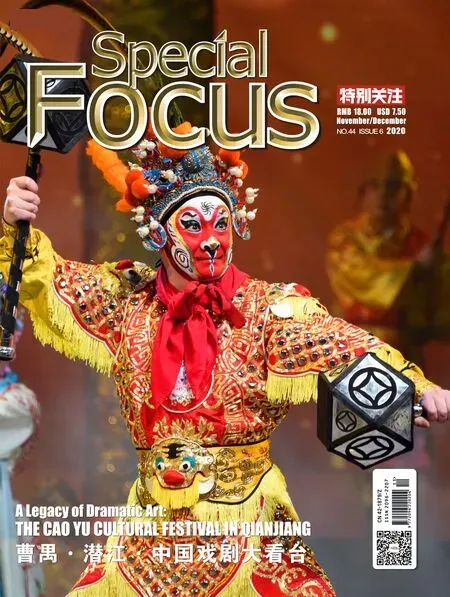A Legacy of Dramatic Art: the Cao Yu Cultural Festival in Qianjiang
By He Sai, Du Shaohua & Xu Yiming
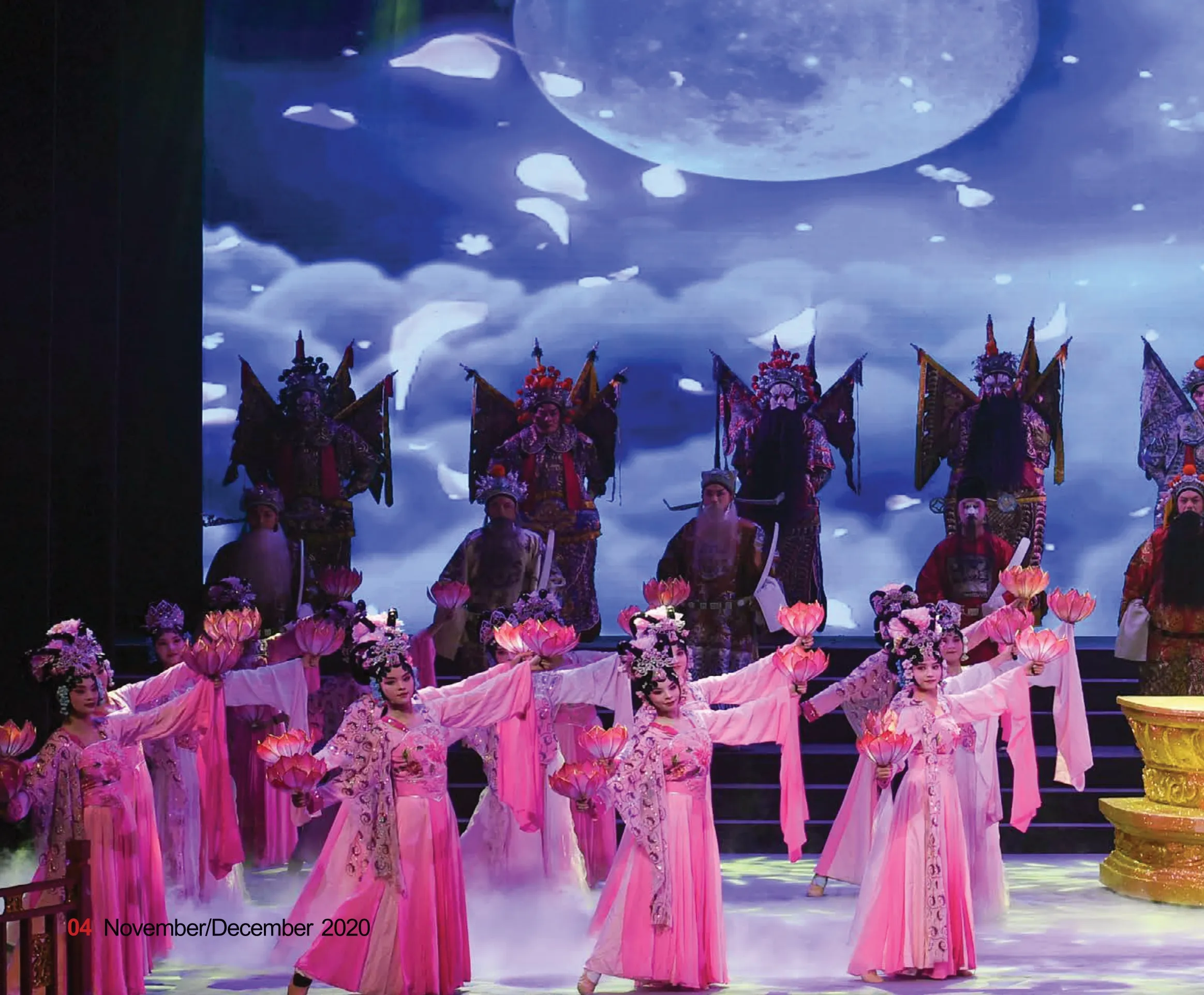
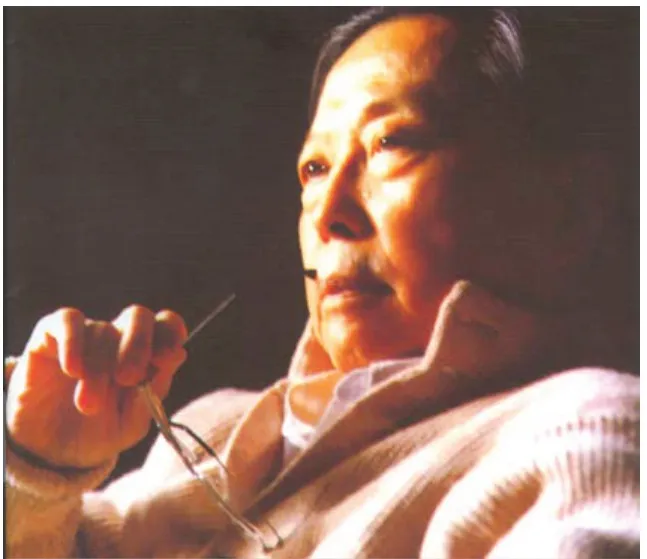
Cao Yu was the most accomplished playwright in the history of modern Chinese drama. His representative works includeThunderstorm, Sunrise,The Wilderness, and Peking Man, all of which have been translated into many languages and gained great fame internationally
曹禺是中国现代话剧史上成就最高的剧作家,其代表作《雷雨》《日出》《原野》《北京人》均被译成多国文字,广泛传播
November 2020 witnessed a carnival of Chinese Opera in Qianjiang City, Central China’s Hubei Province. Fourteen laureates of the Plum Blossom Award for Chinese Opera, together with teachers and students from 8 prestigious universities such as Nankai University, Shanghai Theater Academy, Shaanxi Normal University, and Hubei University of Education, attended the China (Qianjiang) Cao Yu Cultural Festival to perform 21 Chinese opera of various genres for local audiences. Brilliant Peking Opera, Yue Opera, and Sichuan Opera, delicate Huagu Opera, Huangmei Opera, and Shadow Puppet Play, along with melodious Kunqu Opera and Shaanxi Opera, were all performed in the theaters of Qianjiang, instantly bringing the small city into a kaleidoscopic world of Chinese opera. By means of the refined story contents and excellent stage performances, the artists, in the five stylized types of character roles of Sheng (male lead), Dan (female lead), Jing (supporting male lead), Mo (old male role), and Chou (comedy role), vividly displayed the joy of the times and the essence of life.
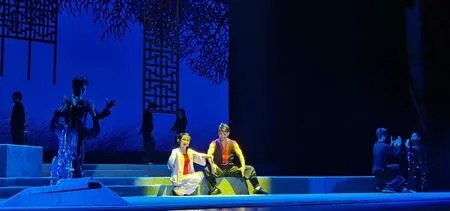
Love and Revenge in the Wilderness, Huagu Opera 花鼓戏《原野情仇》
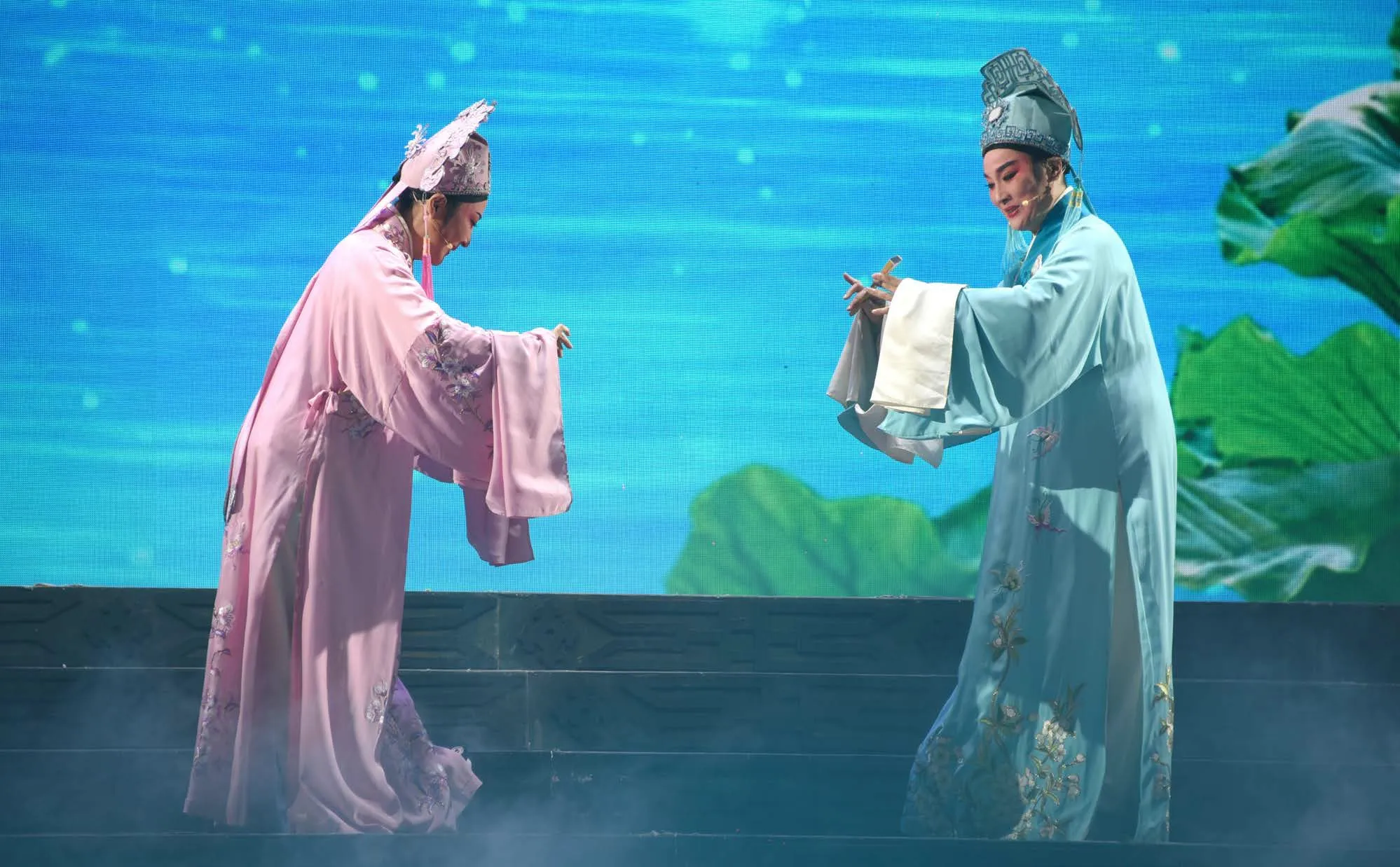
The Butterfly Lovers, an opera performed at the opening ceremony of the Cao Yu Cultural Festival曹禺文化周开幕式戏剧演出《梁祝》
11月的潜江,整个儿成了中国戏剧的海洋。14 位中国戏剧梅花奖得主和南开大学、上海戏剧学院、陕西师范大学、湖北第二师范学院等8 所高校的师生,齐聚潜江,为潜江人民献演了21 场各类中国戏剧。京剧、越剧、川剧,剧剧生辉;花鼓戏、黄梅戏、皮影戏,戏戏精彩;昆曲、秦腔,腔腔悦耳。戏剧流彩,演员献技,把潜江各大剧院舞台变成了中国戏剧历史的万花筒;生旦净末丑,把时代欢歌与精神生活展现得淋漓尽致。
中国中部这个不到30 万人的小城,何以受到全中国戏剧界的青睐,何以成为现代中国新兴的戏剧大看台?这要从戏剧大师曹禺说起。
曹禺剧 四海传
曹 禺(1910年9月24日—1996年12月13日),原名万家宝,祖籍湖北潜江。他出生于天津一个没落的官僚家庭,最终成长为中国杰出的现代话剧剧作家。
曹禺幼年丧母,其母亲孪生妹妹薛咏南嫁给其父万德尊,抚养曹禺长大。薛咏南喜欢看戏,曹禺3岁时就常随继母看戏。京剧、河北梆子、山西梆子、唐山落子、文明戏等中国传统戏剧,曹禺看了个遍,这些戏曲在他幼小的心灵深处烙上了深深的印记,也为他将来的创作奠定了一定的基础。
1922年,曹禺插班入读南开中学,由于对戏剧的热爱,他参加了南开新剧团。曹禺笔名的来源是因为本姓“万(萬)”,结构为上“艹”下“禺”,于是他将“万(萬)”字拆为“草禺”,又因“草”不是姓,故取谐音字“曹”,两者组合而得曹禺。

A Fairy in Human World, Sichuan Opera川剧《别洞观景》
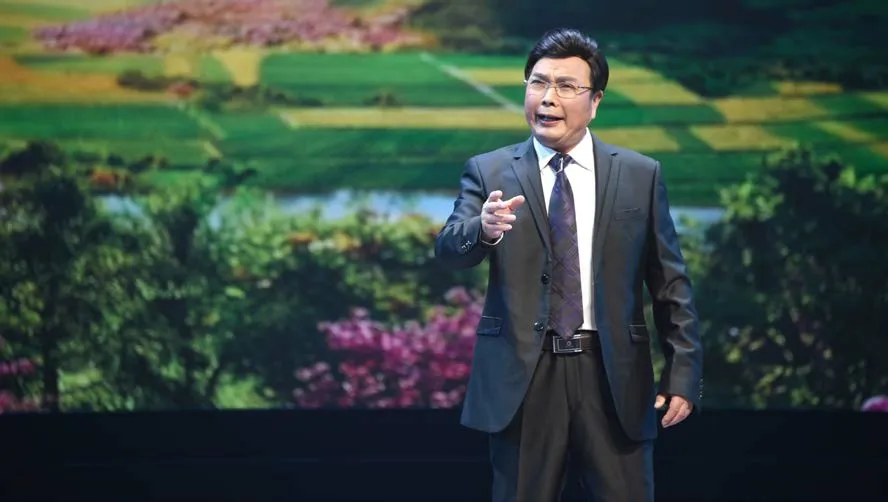
A Family Reunion, Huagu Opera 花鼓戏《认亲记》
Why does this small city with a population of less than 300,000 in Central China draw such popularity among opera circles? And why has it become an emerging grand stage of Chinese opera? All this can be traced back to Cao Yu, the talented playwright of modern Chinese drama.
Cao Yu, China’s Shakespeare
Cao Yu (September 24, 1910-December 13, 1996), pseudonym of Wan Jiabao, was born to a run-down bureaucrat family in Tianjin, north of China, and became an outstanding modern playwright in China.

Legend of Mulan, an opera performed at the opening ceremony of the Cao Yu Cultural Festival曹禺文化周开幕式戏剧演出《木兰传奇》
曹禺与鲁迅、郭沫若、茅盾、巴金、老舍等都是中国新文化运动的开拓者。他是中国现代戏剧的泰斗,戏剧教育家,历任中国文联常委委员、执行主席;中国戏剧家协会常务理事,副主席;中国作协理事,北京市文联主席;中央戏剧学院副院长,名誉院长;北京人民艺术剧院院长等职务。他笔下的每一个角色,都给人们留下了难忘的印象。
1934年曹禺的话剧处女作《雷雨》问世,在中国现代话剧史上具有重要意义,它被公认为是中国现代话剧成熟的标志,曹禺也因此被誉为“东方莎士比亚”。曹禺是中国现代话剧史上成就最高的剧作家,除《雷雨》外,其代表作还有《日出》《原野》《北京人》,均被译成多国文字,广泛传播。
1996年12月13日,因 长 期疾病,曹禺在北京医院辞世,享年86 岁。
看花鼓 认老乡
早在1956年,潜江就成立了潜江花鼓剧团,剧团发扬中国戏剧传统,刻苦创新,成绩斐然。成立之初,剧团就创作了现代小戏《拦花轿》为朱德等中央领导演出;之后,该剧团演出的《平原作战》《家庭公案》《原野》《原野情仇》等多次进京演出,并获得很高评价。
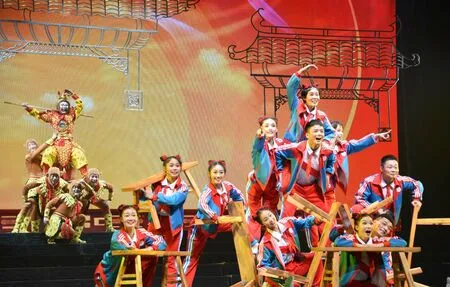
Up on the Rooftop, Peking Opera 京剧《上天台》
Cao’s ancestral home was in Qianjiang, Hubei. He lost his mother at an early age. Later, his mother’s twin sister Xue Yongnan was married to his father Wan Dezun and raised Cao Yu. Xue Yongnan was fond of watching plays. Under her influence, Cao Yu began to watch all genres of traditional Chinese opera, ranging from Peking Opera, Hebei Bangzi, and Shanxi Bangzi to Tangshan Laozi and Wenming Opera (early form of modern drama) with his stepmother starting at just 3 years old. This left deep impressions in his mind and laid the foundation for his future career.
In 1922, Cao Yu was transferred to the Nankai Middle School, where his love for plays brought him into the Nankai Modern Opera Troupe. The name 曹禺 (Cao Yu) originated from his surname 萬 (wan). He dismantled the character down to two structures 艹 (cao; grass) and 禺 (yu). Since the character 艹 could not be used traditionally as a surname, he chose the homophonic character 曹 (cao) instead. He then combined the two characters to form a new name 曹禺.
潜江花鼓剧团一次次赴京演出,引起了曹禺的关注。《家庭公案》演出时,曹禺坐在台下聚精会神地观看着,不停地鼓掌叫绝,演出结束时,曹禺非常激动,大步走上讲台,与演员们亲切握手,说:“老乡见老乡,两眼泪汪汪。”他对大家的表演大加赞赏,其间还请大家到家里做客。曹禺非常欣慰,自己的祖籍所在地潜江能培育出这样一支优秀的戏剧队伍。虽然曹禺一生中未到潜江生活过,但潜江人民对戏剧的热爱和传承,在曹禺心里留下了深刻的印象,在住院期间,他亲笔写下了《我是潜江人》一文:
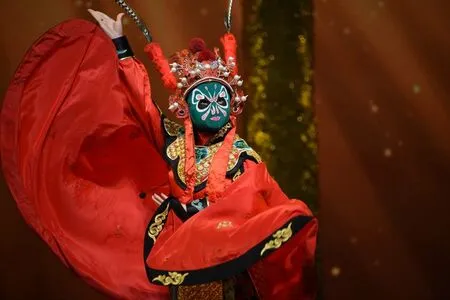
An actor performing face change of Sichuan Opera 一位川剧演员在表演变脸
“多少年来,我像是一个没有故乡的人。我走过不少地方,没有一处使我感到这是我的故乡,是我的父母之邦。我像是一只南来北往的飞鸟,山山水水,高山平原……我认识许多人,听过许多熟习和不熟习的声音,但没有一处使我感到如此亲切,如此动心,像‘潜江人’这三个字,使我从心里觉得温暖、明亮。人问我:‘你贵处哪里?’我答:‘潜江。’我从来没有到过潜江,但近八十年了,我认为我是潜江人,这种贴心的情感,不知怎样造成的。我爱潜江,这不是模模糊糊的几个字,像是其中有血与肉的联系。大约是我从婴儿时,父母的声音笑貌,我吃的家乡带来的食物,或者家庭中那种潜江空气,使我从小到大认为自己是个地地道道的潜江人。‘月是故乡明’,我真觉得潜江的月亮比哪个地方的都圆、都亮,这种乡土的情感也许有点偏执,但我认为中国人的爱国思想有一个原因是从乡土来的。一出国门,人家问,先生从何处来?我便自豪地说:‘我是中国人!’
“我病了一年多,一天也不能出医院。这次潜江开一个这样隆重的会,我确实不能参加。我只感到,我工作一生的成绩不多,也不能令人满意,只有潜江故乡人的深情,才办的这样光彩。老实说,我作为一个文艺工作者,不值得我的众多老乡和许多朋友如此看重的。我打心里感谢潜江父老,潜江家乡的领导和各位专家学者。我是十分感谢的!”
从曹禺先生的这封信中不难看出他对潜江的感情。潜江人在曹禺生活中的出现,潜江人对曹禺先生戏剧的演出,使他回忆起儿时父母的乡音,使他感觉了潜江人民对他的爱戴。
2006年潜江花鼓剧团走出国门,赴德国演出成功。为潜江与德国海登海姆市结为友好城市构建了桥梁。2013年,团长吴培义携移植传统剧目《赵氏孤儿》应邀赴英国参加“寰球舞台演出中国”国际学术交流会。近30年来,剧团共有30 余台戏(次)和100 余人(次)分获国家、省、市各级艺术奖励。
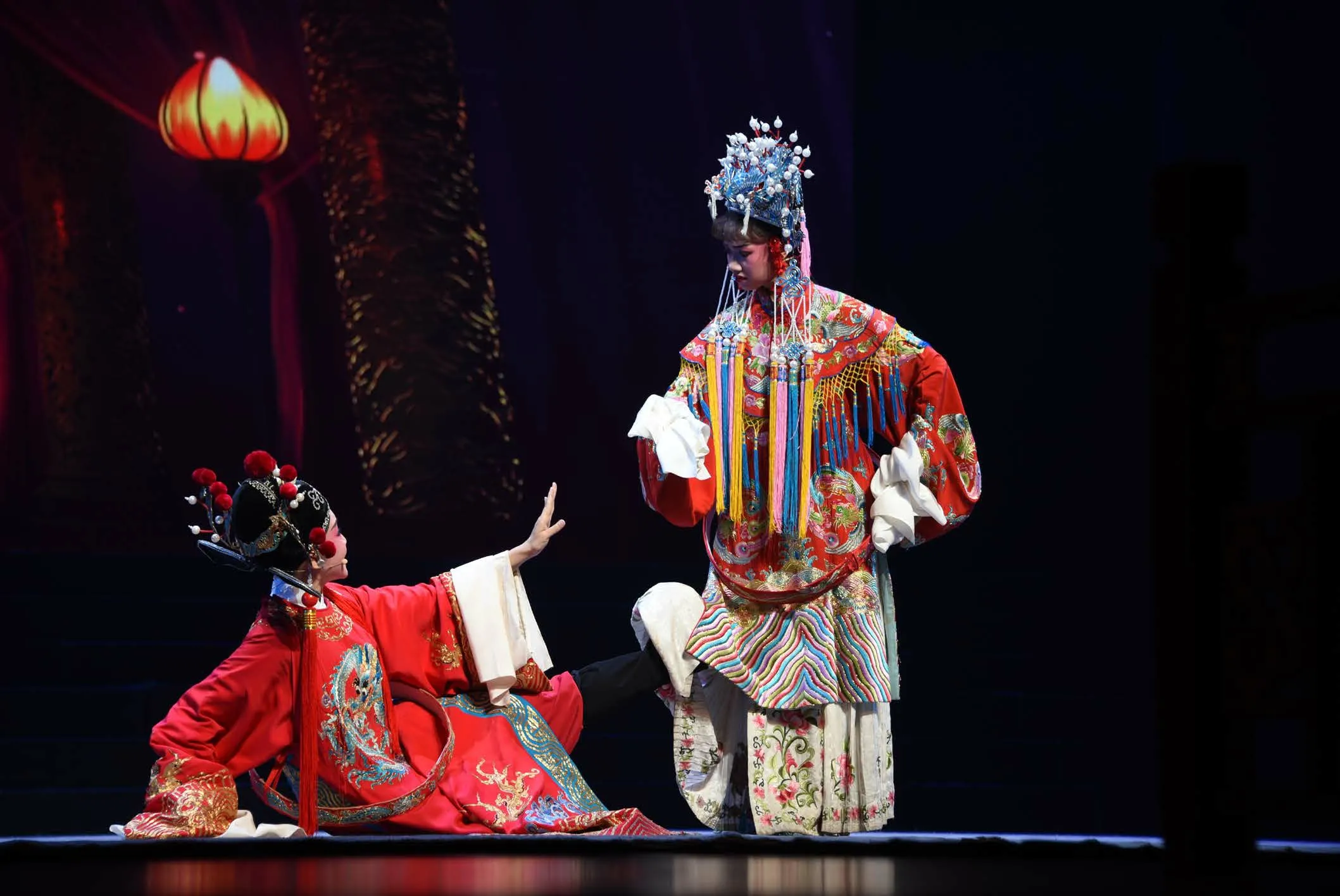
Female Consort Prince, Huangmei Opera 黄梅戏《女驸马》
Cao Yu, Lu Xun, Guo Moruo, Mao Dun, Ba Jin, and Lao She are all ranked as the forerunners of the Chinese New Cultural Movement. Cao Yu is credited as a renowned scholar of modern Chinese drama as well as a famous educator in drama. He ever served as the Executive Chairman of the China Federation of Literary and Art Circles; the Standing Director and Vice Chairman of the Chinese Association of Theater Artists; the Director of the Chinese Writers Association and Chairman of the Beijing Federation of Literary and Art Circles; the Vice President and Honorary Dean of the Central Academy of Drama; and the Dean of Beijing People’s Art Theater. Every role he portrayed in his plays has left an unforgettable impression upon the audiences.
In 1934, Cao Yu’s first play,Thunderstorm, came into existence. It is recognized as a highlight of modern Chinese drama, for which Cao Yu was honored the title of “China’s Shakespeare.” He would go on to later become the most accomplished playwright in the history of modern Chinese drama. In addition toThunderstorm, his representative works include Sunrise, The Wilderness, and Peking Man, all of which have been translated into many languages and gained great fame internationally.
“戏剧之都”潜江
花鼓戏的历史底蕴加上曹禺先生的戏剧成就,使得潜江戏脉传承,加上潜江这个城市的文化自觉和潜江人民对戏曲文化的热爱,使得潜江在戏剧方面的发展突显出来,也使潜江获得了“中国花鼓戏之乡”的美誉,使得潜江“戏剧之都”的大道越走越宽。

Ambush on All Sides, an opera performed at the opening ceremony of the Cao Yu Cultural Festival 曹禺文化周开幕式戏剧演出《十面埋伏》
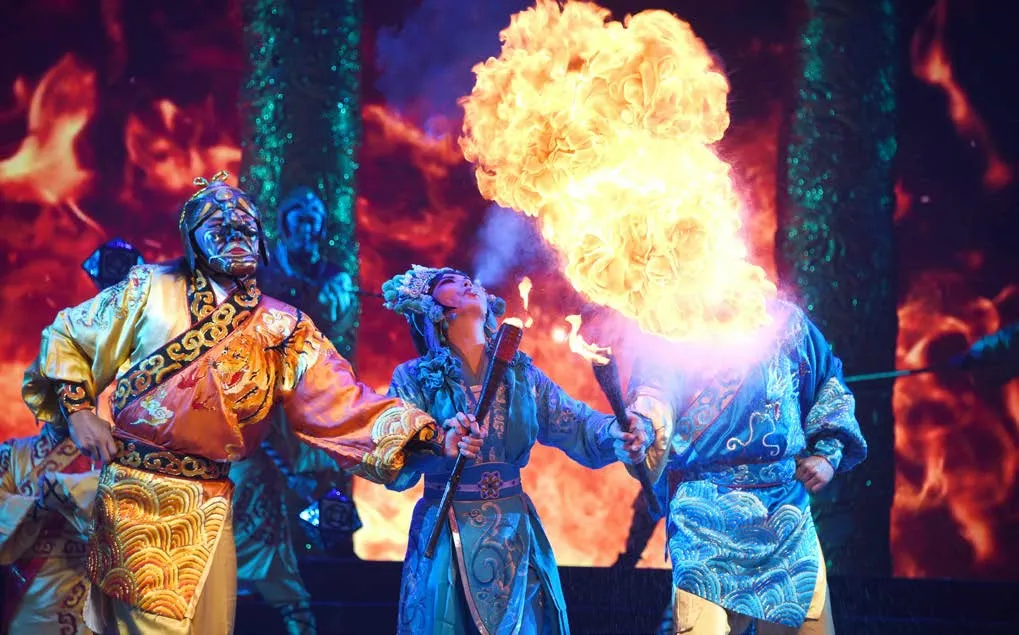
Fire breathing in Sichuan Opera 川剧
潜江人民把曹禺视为内心的骄傲和自豪。为纪念曹禺先生,潜江专门开发了曹禺公园,修建了曹禺纪念馆、曹禺祖居、曹禺大剧院、曹禺茶楼和曹禺陵墓等,曹禺先生的妻子曾亲自带着后人探访潜江。如今曹禺先生的孩子们也都与潜江建立了深厚的感情。

Qianjiang locals dancing the straw-made dragon 潜江人表演非遗文化草把龙
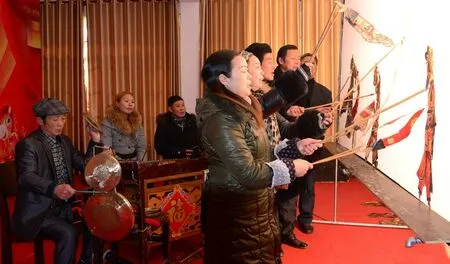
Qianjiang artists performing a shadow play 潜江艺人表演皮影戏
On December 13, 1996, Cao Yu passed away in Beijing Hospital at the age of 86.
“I Am a Qianjiang Native”
The Qianjiang Huagu Opera Troupe was founded in 1956. Adhering to the traditions of Chinese opera, the troupe is committed to innovation and achieving outstanding achievements. At the beginning of its founding, the troupe performed a modern dramaRefusing to Ferry the Palanquinfor Zhu De and other national leaders. After that, the troupe successively presented on stageFighting on the Plains,A Family Case,The Wilderness,Love and Revenge in the Wilderness, and other performances in Beijing and received high praise.
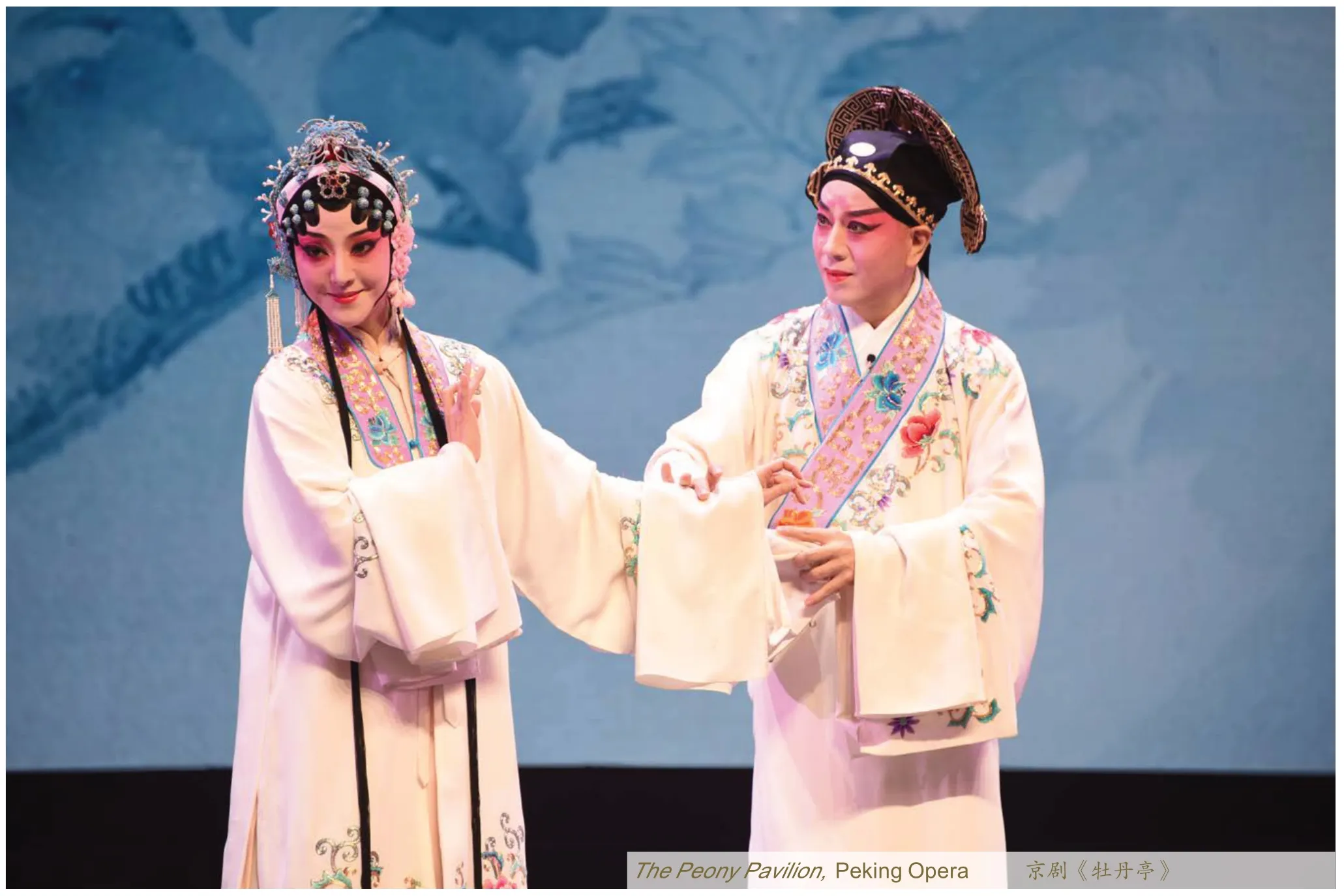
每隔4年,潜江都要举行一届“中国(潜江)曹禺文化周”,纪念曹禺先生,弘扬中国戏剧文化,推动潜江文化发展,扩大潜江戏剧影响力。自2004年11月兴办第一届以来,今年已经是第四届。曹禺先生的堂弟,中国政协副主席、致公党中央主席万钢发来祝贺视频。他说,2020年是曹禺先生诞辰110周年,举办曹禺文化周,对于推动潜江“戏剧之都”建设和丰富人民群众精神文化生活,具有十分重要的意义。他希望,通过举办第四届中国(潜江)曹禺文化周,带动湖北、潜江疫后经济重振和高质量发展,让人民群众共享经济社会发展和文化繁荣发展的成果,让潜江走向世界,让世界认识潜江。
每一届文化周的举办,都是潜江打造“戏剧之都”征程上的动人乐章。今年11月7日晚,为表达对戏剧大师曹禺先生最好的敬意,14 位中国戏剧“梅花奖”获得者,200 余位各剧种戏曲演员,为观众带来一场“国色天香梅韵芬芳”的艺术盛宴。柳萍、韩再芬、陈巧茹、翁国生、谢群英、胡新中、王振义、李雪飞等优秀演员,一招一式,一颦一笑赢得满堂喝彩。
11月8日,曹禺文化旅游城、曹禺戏剧国际交流中心揭牌,这是潜江牵手文旅产业巨头卓尔精心打造的旅游线路。曹禺戏剧国际交流中心将担负起曹禺戏剧文化的日常研究、品牌推广运作和文化产业开发等职责,通过纵向深入与横向联动,实现曹禺品牌打造的“国际化”。“戏剧小镇”也奠基了,这是曹禺文化旅游城的重要组成部分,小镇凸显潜江独特的风貌、风尚与风情,是人们体验潜江的最佳去处。
6年来,为潜江市文化艺术和教育事业蓬勃发展作出积极贡献的上海戏剧学院,再次与潜江市人民政府签订战略合作协议,双方将在深化曹禺文化品牌、推出特色艺术作品、加强艺术人才培养、推动艺术专业建设四个方面开展深入合作交流。
潜江市市委书记吴祖云说,签约促成双方优势互补、互利双赢,有助于潜江继承发扬与创新发展戏剧文化,为潜江的经济社会发展和文化事业振兴起到强劲的推进作用。
戏剧文化是中国优秀传统文化,也是中国人民喜闻乐见的艺术形式,是人民生活幸福的重要组成,潜江立足曹禺,继承和发扬中国戏剧文化,这是潜江自我打造的独特途径。在过去的几年中,德国、英国、美国、法国等国政要都曾访问过潜江,寻求与潜江开展合作的机会和空间。潜江戏剧文化平台将成为湖北乃至中国沟通世界各国文化的桥梁,期待世界各国戏剧界来潜江互访交流,品尝小龙虾和虾乡稻。
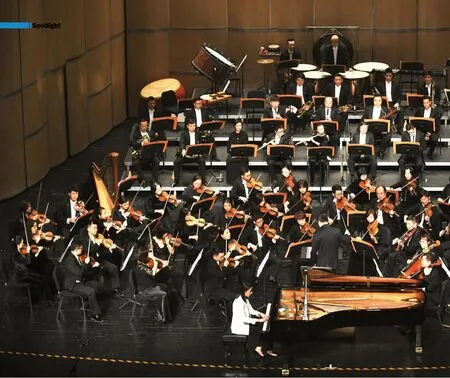
Concert “Echoes of the Yellow River” performed by the Tianjin Symphony Orchestra, part of the Cao Yu Cultural Festival文化周活动之天津交响乐团《黄河回响》音乐会
The troupe attracted Cao Yu’s attention because of its impressive performances in Beijing time and again. WhenA Family Casecame onto the stage, Cao Yu sat among the audience and watched attentively, clapping and cheering from time to time. At the end of the performance, Cao Yu strode to the podium excitedly, shook hands with the actors, and said, “I’m so happy to see my hometown folks that I could cry.” He praised the performance and invited everyone to visit his home. Cao Yu was very pleased that Qianjiang, his ancestral home, could have such an excellent drama troupe. Although he never lived in Qianjiang in person, Cao Yu was impressed by Qianjiang’s love of the opera culture. During his hospitalization, he wrote the article “I Am a Qianjiang Native,” two paragraphs of which went like this:
For many years, I have been like an isolated bird without a habitat. I traveled to many places, and nowhere feels like my hometown, the birthplace of my parents. I have been like a bird flying north and south, over mountains, rivers, and plains... I’ve seen many people and heard many accents, familiar and unfamiliar, yet none of which sounds so cordial and endearinglike the words “Qianjiang man,” which warmed and lighted my heart. When someone asked me: “Where are you from?” I replied instantly: “Qianjiang.” I have never been to Qianjiang, but for nearly 80 years, I have been considering myself a Qianjiang native. I can’t tell where exactly this bond comes from. The words “I love Qianjiang” are not something vague for me, it’s as real as flesh and blood. It’s probably because of my parents’ voice and laughter, the style of the food I ate, and the Qianjiang atmosphere in my family when I was a baby, all of which made me feel like a Qianjiang native since I was young. As a saying goes, “The moon of one’s hometown is always the brightest.” I do think the moon in Qianjiang is better than that of anywhere else, which might sound a bit silly, but I guess hometown and homesickness are the reasons why we nurture our patriotism. When I was abroad and asked where I come from, I always proudly answered: “I’m from China!”
Having been ill for more than a year, I cannot leave the hospital even for one day. I regret missing such a grand meeting in Qianjiang this time. I feel that I don’t have many achievements in my life, not enough satisfactory works either; it’s the affection of my folk people in Qianjiang that has made my drama so wonderful. As a literary and artistic worker, I am not worthy of so much love by my country fellows and friends. I want to thank my folk people, as well as the leaders, experts and scholars of Qianjiang.
From his letter we can see Cao Yu’s true love for Qianjiang, whose people came into his life and performed his works, and reminded him of his parents’ local accent in his childhood and made him feel a strong sense of love.
In 2006, the Qianjiang Huagu Opera Troupe went abroad and had a successful performance in Germany and led to the establishment of a sister city relationship between Qianjiang and Heidenheim, Germany. In 2013, Wu Peiyi, head of the troupe, reimagined the traditional playThe Orphan of Zhaoand participated in an international academic exchange conference entitled Performing China on the Global Stage. In the past 30 years, more than 30 operas and more than 100 actors of the troupe have been awarded national, provincial, and municipal art awards.
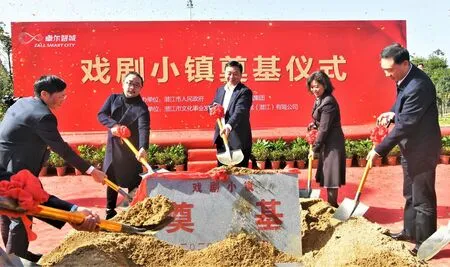
Foundation stone laying ceremony of the Drama Town 戏剧小镇奠基仪式
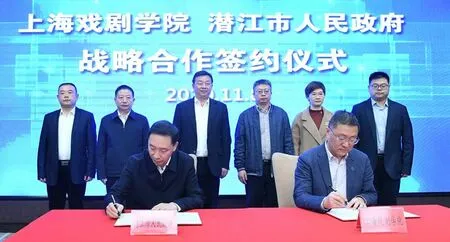
Shanghai Theater Academy and Qianjiang Municipal People’s Government signing a strategic agreement during the Cao Yu Cultural Festival曹禺文化周期间上海戏剧学院与潜江市人民政府签署战略协议
Qianjiang, the Capital of Opera
With its historical legacy of Huagu Opera and Cao Yu’s modern dramatic works, plus the local residents’ cultural awareness and inborn love for opera, Qianjiang City boasts a prominent position in the opera industry. Therefore, its reputation as the “Hometown of Chinese Huagu Opera” has been widely acclaimed and paved the way for the title of the “Capital of Opera.”
Locals in Qianjiang are proud of Mr. Cao. Cao Yu Park, Cao Yu Memorial Hall, Cao Yu Ancestral Residence, Cao Yu Grand Theater, Cao Yu Tea House, and Cao Yu Mausoleum were built in honor of him. Mr. Cao’s wife came in person to visit Qianjiang with their children, who have also established a close relationship with Qianjiang.

International students in front of Cao Yu Memorial Hall 留学生们在曹禺纪念馆前合影留念
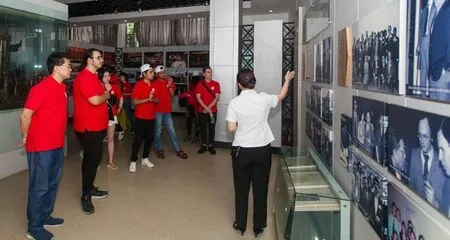
A docent introduces Cao Yu’s life to international students解说员向留学生介绍曹禺生平

An international student shooting a photo of an exhibit in Cao Yu Memorial Hall 留学生用手机拍下曹禺纪念馆馆藏
The China (Qianjiang) Cao Yu Cultural Festival is held once every 4 years to commemorate the great playwright, as well as to promote Chinese opera culture and popularize Qianjiang opera. After the first session was held in November of 2004, this year welcomed the fourth iteration of the event. Wan Gang, Cao Yu’s cousin, Vice Chairman of the Chinese People’s Political Consultative Conference and Chairman of China Zhigong Party’s Central Committee, delivered a congratulatory video speech. He said that 2020 is the 110th anniversary of the birth of Mr. Cao Yu, and the China (Qianjiang) Cao Yu Cultural Festival is a meaningful event, which can promote the construction of Qianjiang as “the Capital of Opera” and enrich the cultural life of local people. He hopes the 4th China (Qianjiang) Cao Yu Cultural Festival will promote post-epidemic economic recovery and the development of Hubei Province and Qianjiang City, so that local people can enjoy a better life through economic, social, and cultural prosperity. As a result, Qianjiang can walk proudly towards the world and the world will know Qianjiang better.
Each session of the cultural festival has signaled steady progress in Qianjiang’s journey towards the “Capital of Opera.” On the evening of November 7, 2020, in order to express their respect to Mr. Cao Yu, 14 winners of the Plum Blossom Award, such as Liu Ping, Han Zaifen, Chen Qiaoru, Weng Guosheng, Xie Qunying, Hu Xinzhong, Wang Zhenyi, Li Xuefei, and the like, joined hands with more than 200 opera actors and actresses from various genres to co-perform the grand stage performance named “National Beauty in Full Bloom,” winning the applause of the audience with their delicate stage movement and charming facial expressions.
On November 8, Cao Yu Cultural Tourism City and Cao Yu Drama International Exchange Center was launched. They belong to a tourism route designed and created by the Qianjiang government and Zall, the cultural and tourism group. The center is to engage in academic research, brand promotion, and industrial development of Cao Yu’s drama works, in the hope of achieving the “internationalization” of the “Cao Yu brand” through multiple channels. The Drama Town under construction is an important part of the Cao Yu Cultural Tourism City project. The town will showcase the unique features, styles, and customs of Qianjiang, and will be an ideal place for people to experience Qianjiang.
In the past 6 years, Shanghai Theater Academy, which has made great contributions to the vigorous development of Qianjiang’s culture, art, and education, signed a strategic cooperation agreement with the Qianjiang Municipal People’s Government. Both sides will conduct in-depth cooperation and exchanges in four areas: promoting the “Cao Yu Brand,” launching good works of art, strengthening the education of artistic talents, and pushing forward the construction of the art major.
Wu Zuyun, Secretary of the CPC Qianjiang Committee, said that the agreement will facilitate mutual strength and mutual benefit and help Qianjiang inherit and promote its opera culture in an innovative pattern, which will greatly improve Qianjiang’s economic, social, and cultural development.
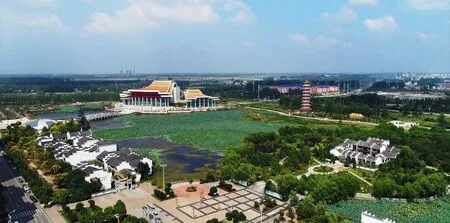
A bird’s view of Cao Yu’s ancestral residence and Cao Yu Grand Theater 俯瞰曹禺祖居和曹禺大剧院
Opera is an outstanding traditional culture and a popular art form among Chinese people. It plays an important part in Chinese people’s identity and well-being. Based on Cao Yu’s drama, Qianjiang has inherited and developed Chinese drama culture, exploring a unique way to build itself. Over the past few years, politicians and leaders from Germany, Britain, the United States, France, and other countries have visited Qianjiang to seek opportunities for cooperation. The local drama culture will serve as a bridge for communication between Hubei Province, China, and other places around the world. Qianjiang hopes to become an international platform for drama and cultural exchanges where drama circles from all over the world can come to take in Chinese Opera and have a taste of local crayfish and rice.
(Translation: Lu Qiongyao)

